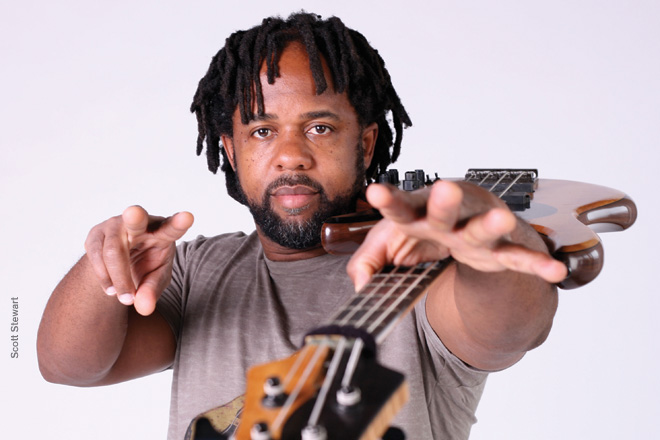VICTOR WOOTEN
The bass virtuoso follows his own path to musical innovation
Over the course of eight solo records, and many others he’s recorded as a member of progressive bluegrass band Bela Fleck and the Flecktones, Victor Wooten has shown he’s rarely content to play by the rules. As one of today’s most innovative musicians, he’s furthered the evolution of bass from traditional role of backing rhythm to front and center as a lead instrument. “One of my gifts is to know the rules of music well enough to break them,” Wooten says.
The five-time Grammy winner proves that again, releasing two new albums simultaneously on his own Vix Records label. Words and Tones and Sword and Stone contain many of the same songs—the former featuring vocal versions and the latter entirely instrumental.
Wooten learned the bass at an early age and soon became a member of the family group the Wooten Brothers Band. He and his four brothers—guitarist Regi, drummer Roy, saxophonist Rudy and keyboardist Joseph—performed professionally throughout the 1970s around their hometown of Hampton, Va., before relocating to Nashville in the mid-’80s. He credits his older siblings for helping him stretch his musical parameters. “Regi showed me how to use my thumb to go in two directions, the way you would use a guitar pick,” he says. “That was a technical turning point because that expanded what I could do with my thumb.”
Victor had another, less technical turning point during his early teens. “It dawned on me in junior high that I’d never have to get a real job if I kept doing this,” he says. “So I started learning more and realized the gift of music was in the palm of my hand, and I could do anything with it. It’s like once you have the power to count to 10, you have the power to go as high as you want to go. No matter how high you count, you’ll never come to the end. I look at music that way. I’m no closer to the end of it. I’m just seeing how high I can count by going and going and going.”
Wooten’s career took a leap in 1987 when he connected with banjo virtuoso Bela Fleck. During their first meeting the two jammed for hours in Fleck’s kitchen. The session planted the seeds for the Flecktones—Bela’s backing band that includes Victor’s brother Roy (known by his stage name, Future Man).
Right now, Victor’s focus is on his solo albums—and not surprisingly, extended bass solos dominate. One track,
“Keep It Low,” features no less than a dozen musicians playing basses simultaneously. “It’s rare that I have a song totally complete when I bring the other musicians in,” says Wooten. “I want the other players to contribute and affect the arrangements.”
Wooten also devotes a portion of his time to teaching classes, workshops and seminars, including his Wooten Woods musical camps, which have become an annual tradition. He’s written several books about bass technique and recorded instructional videos. Wooten believes musical expression is similar to language communication. “Babies aren’t born speaking English, but they are born with emotions,” he explains. “It’s the way they communicate those emotions that’s important, not the language they use. It’s the same with music. It’s not necessarily about learning the instrument. It’s more about learning to communicate with it.”
Wooten extends the metaphor to his instrument. “The electric bass is still an infant. It’s only about 60 years old, and it’s changing every day. People are paying attention to what I’m doing, and I appreciate that. But I’ve also got to say we haven’t seen anything yet.”
–Lee Zimmerman




comment closed